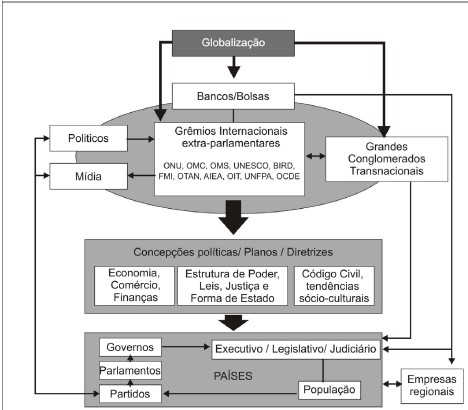Analise atentamente o gráfico abaixo e observe o processo que se desencadeou nas últimas décadas do século XX, e que foi decisivo para consolidar a presente fase do Capitalismo e da Divisão Internacional do Trabalho, chamada Globalização.
BOLIGIAN, Levon e MARTINEZ, Garcia. Geografia – Espaço e Vivência. São Paulo: Ed. Saraiva, v.9 , p.19

Considerando as informações obtidas somente na leitura do gráfico acima, pode-se concluir CORRETAMENTE que
- A) a Globalização traz oculta a lógica da acumulação capitalista, baseada na crescente concentração de riquezas nas mãos da maioria dos países.
- B) a migração financeira dos bancos, bolsas de valores e dos grandes conglomerados mundiais fazem com que Estados sejam controlados pelo capital.
- C) os blocos econômicos são de importância expressiva para o Fundo Monetário Internacional, em função da igualdade econômica existente entre os países membros.
- D) as transnacionais são empresas que conduzem suas estratégias de produção e funcionamento, limitando- se às suas próprias fronteiras.
Resposta:
Considering the information obtained only from reading the graph above,, we can conclude correctly that: B) The financial migration of banks, stock exchanges, and large global conglomerates makes it so that States are controlled by capital.
This is because the graph shows the increasing concentration of wealth and power in the hands of a few large corporations and financial institutions, leading to a loss of control by nation-states. This process is characteristic of the current phase of capitalism, known as globalization.
In the graph, we can see that the concentration of wealth and power has increased significantly over the past few decades, particularly in the 1980s and 1990s. This is evident from the sharp increase in the percentage of wealth held by the top 1% of the population.
This concentration of wealth and power has led to a situation where large corporations and financial institutions have more influence over the economy and politics than nation-states. This is because they have the resources and the ability to operate across borders, making them less dependent on any particular country or government.
As a result, nation-states have lost control over their economies and are now more susceptible to the whims of the global market. This has led to a situation where the interests of capital are prioritized over those of the people, leading to increased inequality and social unrest.
Therefore, option B is the correct answer, as it accurately describes the process of financial migration and the concentration of power in the hands of a few large corporations and financial institutions, leading to a loss of control by nation-states.

Deixe um comentário